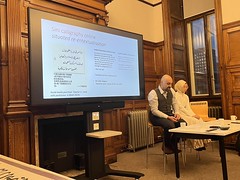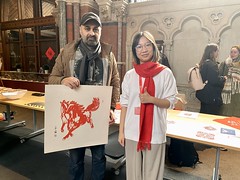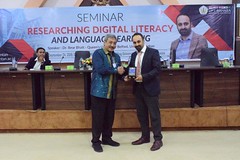It was a pleas ure to present, meet researchers, and listen to the insights of others at the “Everyday Literacies” conference at Sheffield University on Friday. One of the things that appealed to me about the conference, and eventually to register and send an abstract, is its emphasis on problematising what some regard as formal, curricular, or elite LiteracIES against personal, social, or vernacular ones. As only through doing so can we challenge the notion that a simple ‘lack’ of LiteracY holds people back, and that people’s “everyday literacies” can be a fruitful foundation for learning and development.
ure to present, meet researchers, and listen to the insights of others at the “Everyday Literacies” conference at Sheffield University on Friday. One of the things that appealed to me about the conference, and eventually to register and send an abstract, is its emphasis on problematising what some regard as formal, curricular, or elite LiteracIES against personal, social, or vernacular ones. As only through doing so can we challenge the notion that a simple ‘lack’ of LiteracY holds people back, and that people’s “everyday literacies” can be a fruitful foundation for learning and development.
Yet these ‘wild’ and ‘feral’ literacies can and will find there way in to traditional pedagogic spaces and some of the conference sessions dealt with how these are “discourses” that “circulate” in classroom activities (Janet Maybin), temporally and spatially traceable across the “everyday and the faraway” (Mary Hamilton), and part of tech users’ “polymedia” activities (Victoria Carrington).
The idea of a classroom as a ‘nexus’ of literacies is something which echoes Brandt and Clinton’s (2002) call for us to question the “limits of the local” in literacy research, and for it to take into account the “larger enterprises…away from the immediate scene” (Brandt and Clinton, 2002: p. 338). I am also reminded here of Latour’s (1993) argument that modernity seeks to separate entities, spatially and temporally; as all contexts, especially classrooms, are fluid and created through the agentive work of actors not always in situ (c.f.Edwards, 2009 on ‘rethinking contexts’).
In this vein, Mary Hamilton’s session stressed how the role of ‘actor-network theory’, and its palette of resources, can shed light on literacy practices and literacy events, and their configurations over space and time. This I something I am also chewing over in my study …
Anyway, my prezi was one of those mini-presentations and, being a fan of the old ‘elevator pitch’, I very much prefer them to long drawn out lectures. Especially since they can breed a good discussion afterwards.
Here is my prezi for that session:
Unfortunately I couldn’t attend for the second day, but this is definitely a conference to watch out for and follow.
BRANDT, D. & CLINTON, K. (2002). Limits of the Local: Expanding Perspectives on Literacy as a Social Practice. Journal of Literacy Research, 34(3), 337-56.
EDWARDS, R. (2009). Introduction: Life as a Learning Context? In: EDWARDS, R., BIESTA, G. & THORPE, M. (eds.) Rethinking contexts for learning and teaching. London: Routledge. 1-13.
LATOUR, B. (1993). We have never been modern, New York ; London: Harvester Wheatsheaf.
Categories: Digital Literacies, Lectures, PhD Reflections, Technologies










